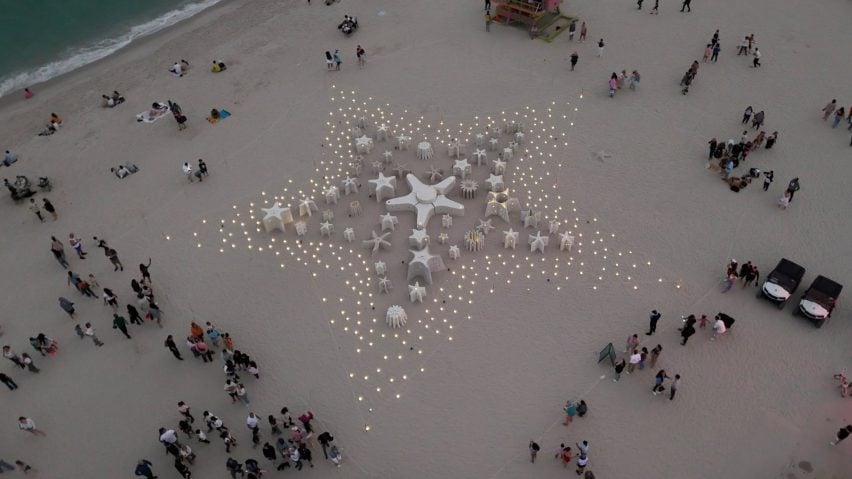In collaboration with architect Alberto Latorre, artist Carlos Betancourt has installed a series of 3D-printed stars along the shore of Miami Beach for Miami art week, models of structures that will eventually be placed underwater to act as a "hybrid coral reef".
Miami Reef Star is part of a multi-phase rollout of ReefLine, a 15-acre underwater sculpture park master-planned by OMA and ReefLine founder Ximena Caminos that will encompass a variety of installations meant to act as replacement for marine environment lost to climate change.
"Placed in 15-20 feet (4.5 to 6 metres) of water and within swimming distance from the shore, the ReefLine will feature environmentally functional artworks, incorporating proprietary materials that will act as hybrid coral reefs, and offer the community a free opportunity to engage directly with Miami's marine biodiversity and underwater public art," said the team.
The installation by Betancourt and Latorre consists of 46 different star-shaped modules arranged in a larger star shape that was fabricated at the University of New Hampshire.
They range in size and design, with some resembling starfish and others, floral motifs.
Each module features openings or small holes, and for the Miami art week debut, lights were placed in and around the objects to create an illuminated installation.
Like the other installations as part of the future ReefLine, the final "stars" will likely be made of CarbonXinc, a material developed by artist Petroc Sesti, pending approval by Miami-Dade County Department of Environmental Resources.
According to the New York Times, the material is a "zero-cement geopolymer concrete with mineralized carbon dioxide gas that captures carbon destined for the atmosphere and stores it for an indefinite amount of time".
The various installations will also utilise Coral Lok, a device that aids in coral out-planting, or growing coral in a lab environment before planting it in the wild.
Displayed on the beach at Miami Beach's Mid-Beach coastline for art week, the entire installation will eventually be submerged underwater as part of ReefLine, where it will stretch 90 feet (27 metre) in diameter and be viewable from airplanes above.
Other installations set to submerge will include "life-size concrete car sculptures" by artist Leandro Erlich and a staircase sculpture by OMA partner Shohei Shigematsu.
"The ReefLine seeks to perform a unique kind of 'marine acupuncture,' blending art and innovative blue technology to target vital pressure points in the ocean," said Caminos.
"Our goal is to unlock their regenerative potential, ultimately restoring what has been lost to the devastating effects of climate change while fostering community engagement and awareness."
ReefLine is slated to "break water" in Spring 2025, while it was originally announced in 2020. Previously, OMA, Charlotte Taylor and Nicholas Préaud created NFT artwork to help promote the project.
Miami Reef Star will be de-installed at the end of the city's art week.
Other installations and exhibits on view around the city are Alcova Miami and a kinetic sculpture made of bioplastic by Crafting Plastics.
The photography is by Ilai Belaustegui unless otherwise stated.
Miami Reef Star is on view on the Mid-Beach coastline from 3 to 8 December as part of Miami art week. For more global events in architecture and design visit Dezeen Events Guide.

